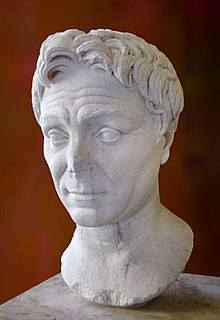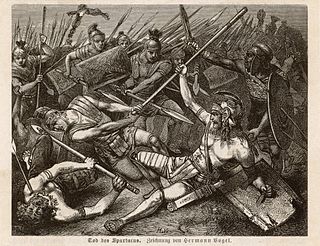
Gaius Julius Caesar, known by his nomen and cognomen Julius Caesar, was a Roman politician, military general, and historian who played a critical role in the events that led to the demise of the Roman Republic and the rise of the Roman Empire. He also wrote Latin prose.

Gnaeus Pompeius Magnus, usually known in English as Pompey or Pompey the Great, was a military and political leader of the late Roman Republic. He came from a wealthy Italian provincial background, and his father had been the first to establish the family among the Roman nobility. Pompey's immense success as a general while still very young enabled him to advance directly to his first consulship without meeting the normal requirements for office. His success as a military commander in Sulla's second civil war resulted in Sulla bestowing the nickname Magnus, "the Great", upon him. His Roman adversaries insulted him as adulescentulus carnifex, "the teenage butcher", after his Sicilian campaign. He was consul three times and celebrated three triumphs.

Marcus Junius Brutus, often referred to as Brutus, was a politician of the late Roman Republic. After being adopted by his uncle he used the name Quintus Servilius Caepio Brutus, but eventually returned to using his original name. He took a leading role in the assassination of Julius Caesar.

In classical mythology, Hermanubis was a god who combined Hermes with Anubis. He is the son of Set and Nephthys.
National service is a system of either compulsory or voluntary government service, usually military service. Conscription is mandatory national service. The term national service comes from the United Kingdom's National Service Act 1939. Many young people spent one or more years in such programmes. Compulsory military service typically requires all male citizens to enroll for one or two years, usually at age 18, while voluntary national service requires only three months of basic military training. The US equivalent is Selective Service. In the United States, voluntary enrollments at the Peace Corps and AmeriCorps are also known as national service.
Sir Thomas North (1535–1604) was an English justice of the peace, military officer and translator. His translation into English of Plutarch's Parallel Lives is notable for being a source text used by William Shakespeare for several of his plays.

Cleomenes III was one of the two kings of Sparta from 235 to 222 BC. He was a member of the Agiad dynasty and succeeded his father, Leonidas II. He is known for his attempts to reform the Spartan state.

Eumenes of Cardia was a Greek general and satrap. He participated in the Wars of the Diadochi as a supporter of the Macedonian Argead royal house. He died after the Battle of Gabiene in 316 BC.

The Third Servile War, also called by Plutarch the Gladiator War and The War of Spartacus, was the last in a series of slave rebellions against the Roman Republic, known collectively as the Servile Wars. The Third was the only one directly to threaten the Roman heartland of Italia. It was particularly alarming to Rome because its military seemed powerless to suppress it.
The Battle of Carrhae[ˈkar.rae̯] was fought in 53 BC between the Roman Republic and the Parthian Empire near the town of Carrhae,. The Parthian general Surena decisively defeated a numerically superior Roman invasion force under the command of Marcus Licinius Crassus. It is commonly seen as one of the earliest and most important battles between the Roman and Parthian empires and one of the most crushing defeats in Roman history.

Plutarch's Lives of the Noble Greeks and Romans, commonly called Parallel Lives or Plutarch's Lives, is a series of biographies of famous men, arranged in tandem to illuminate their common moral virtues or failings, probably written at the beginning of the second century AD. The surviving Parallel Lives comprises 23 pairs of biographies, each pair consisting of one Greek and one Roman, as well as four unpaired, single lives. It is a work of considerable importance, not only as a source of information about the individuals described, but also about the times in which they lived.
Agrionia was an ancient Greek religious festival in honor of Dionysus Agrionius. It was celebrated annually, especially at Orchomenus in Boeotia.
Colotes of Lampsacus was a pupil of Epicurus, and one of the most famous of his disciples. He wrote a work to prove That it is impossible even to live according to the doctrines of the other philosophers. It was dedicated to king Ptolemy II Philadelphus. In refutation of it Plutarch wrote two works, a dialogue, to prove, That it is impossible even to live pleasantly according to Epicurus, and a work entitled Against Colotes. According to Plutarch, Colotes was clever, but vain, dogmatic and intolerant. He made violent attacks upon Socrates, and other great philosophers. He was a great favourite with Epicurus, who used, by way of endearment, to call him Koλωτάρας and Koλωτάριoς. It is also related by Plutarch, that Colotes, after hearing Epicurus discourse on the nature of things, fell on his knees before him, and besought him to give him instruction. He held that it is unworthy of the truthfulness of a philosopher to use fables in his teaching, a notion which Cicero opposes.

Alea iacta est is a variation of a Latin phrase attributed by Suetonius to Julius Caesar on January 10, 49 B.C. as he led his army across the Rubicon river in Northern Italy. With this step, he entered Italy at the head of his army in defiance of the Senate and began his long civil war against Pompey and the Optimates. The phrase, either in the original Latin or in translation, is used in many languages to indicate that events have passed a point of no return. It is now most commonly cited with the word order changed rather than in the original phrasing. The same event inspired another idiom with the same meaning, "Crossing the Rubicon".

Aglaonice or Aganice of Thessaly was a Greek astronomer of the 2nd or 1st century BC. She is mentioned in the writings of Plutarch and in the scholia to Apollonius of Rhodes as a female astronomer and as the daughter of Hegetor of Thessaly. She was regarded as a sorceress for her ability to make the Moon disappear from the sky, which has been taken to mean she could predict the time and general area where a lunar eclipse would occur.
Evander, born in Phocis or Phocaea, was the pupil and successor of Lacydes, and was joint leader (scholarch) of the Academy at Athens together with Telecles.
Plutarch of Athens was a Greek philosopher and Neoplatonist who taught at Athens at the beginning of the 5th century. He reestablished the Platonic Academy there and became its leader. He wrote commentaries on Aristotle and Plato, emphasizing the doctrines which they had in common.
Plynteria was a festival of ancient Greece celebrated at Athens every year, on the 22nd of Thargelion, in honor of Athena Polias, with the heroine Aglauros, whose temple stood on the Acropolis. The festival's name came from plynein (πλύνειν), a Greek verb meaning "to wash".

Spartacus was a Thracian gladiator who, along with the Gauls Crixus, Gannicus, Castus, and Oenomaus, was one of the escaped slave leaders in the Third Servile War, a major slave uprising against the Roman Republic. Little is known about Spartacus beyond the events of the war, and surviving historical accounts are sometimes contradictory and may not always be reliable. However, all sources agree that he was a former gladiator and an accomplished military leader.













